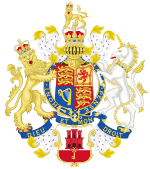
Back سياسة جبل طارق Arabic Πολιτική του Γιβραλτάρ Greek Política de Gibraltar Spanish Politique à Gibraltar French जिब्राल्टर की राजनीति Hindi Ustrój polityczny Gibraltaru Polish Política de Gibraltar Portuguese Государственный строй Гибралтара Russian
 |
|---|
|
|
The politics of Gibraltar takes place within a framework of a parliamentary representative democratic British Overseas Territory, whereby the Monarch of the United Kingdom is the constitutional head of state represented by the Governor of Gibraltar. The Chief Minister of Gibraltar is the head of Government. As a British Overseas Territory, the Government of Gibraltar is not subordinate to the Government of the United Kingdom. The British Government, however, is responsible for defence and external affairs but Gibraltar has full internal self-government under its 2006 Constitution.
The government of Spain continues with an irredentist territorial claim to Gibraltar, which was ceded in perpetuity to the British Crown in 1713 by Article X of the Treaty of Utrecht. In a referendum held in 2002, a proposal for shared sovereignty was overwhelmingly rejected by the Gibraltar electorate with 98.97% voting against.[1] The sovereignty issue remains an important factor in local politics.
Gibraltar has a number of political parties which have developed to address local issues. The preamble to the 2006 Constitution repeated from the 1969 Constitution states that "Her Majesty's Government will never enter into arrangements under which the people of Gibraltar would pass under the sovereignty of another state against their freely and democratically expressed wishes."[2]
- ^ "Q&A: Gibraltar's referendum". BBC News. 8 November 2002. Retrieved 22 May 2010.
- ^ "Archived copy" (PDF). Archived from the original (PDF) on 7 June 2011. Retrieved 7 June 2011.
{{cite web}}: CS1 maint: archived copy as title (link)